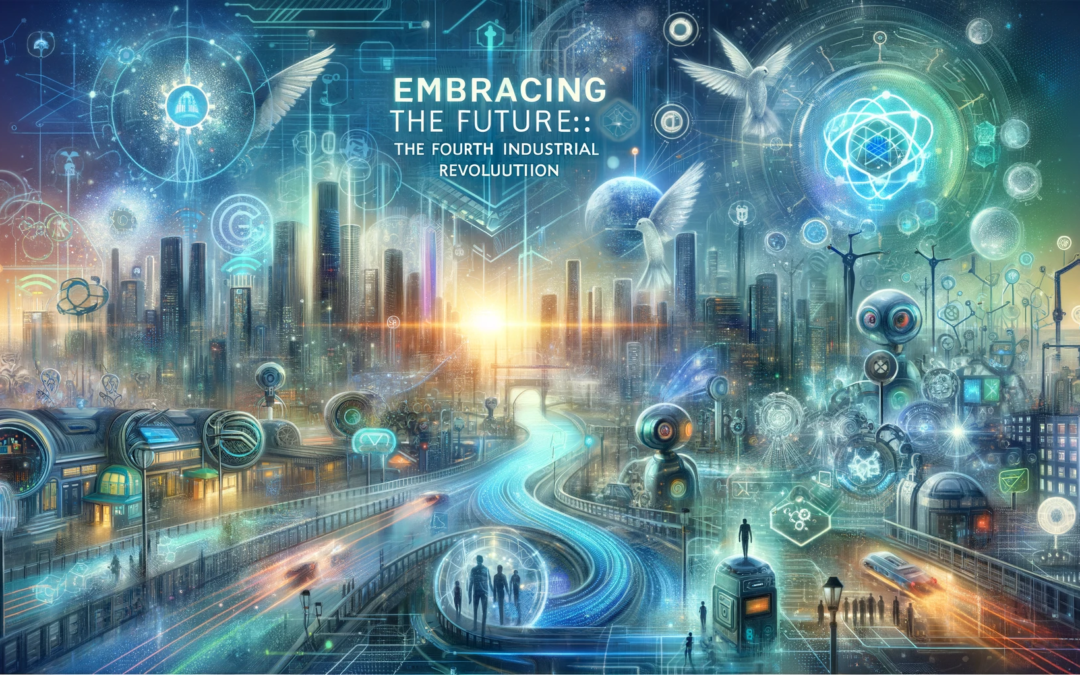As we conclude our series on the Fourth Industrial Revolution, we look forward to the future, envisioning the advancements it might bring and preparing for the changes it will inevitably cause. This final part explores future trends, adaptation strategies, and the role of Industry 4.0 in sustainable development.
Future Trends and Predictions
Technological Advancements: The Fourth Industrial Revolution has already brought us incredible advancements in AI, IoT, and robotics. But what does the future hold for these technologies? Will AI become our new overlords, or will we find a balance between human and machine intelligence? Only time will tell, but it’s safe to say that these technologies will continue to shape our lives and the global economy.
Emerging Fields: While we’re still grappling with the possibilities of AI and IoT, new frontiers are already opening up. Quantum computing, for example, has the potential to revolutionize everything from cryptography to drug discovery. And let’s not forget about advanced material science, which could lead to stronger, lighter, and more sustainable materials.
Societal Impact: As technology continues to advance, it’s important to consider the long-term societal changes it may bring. We need to address questions of privacy, ethics, and lifestyle. How do we ensure that our personal data is protected? How do we navigate the ethical dilemmas posed by AI? And how do we maintain a healthy work-life balance in a world where technology is always at our fingertips?
Preparing for Change
Strategies for Businesses: In order to thrive in the Fourth Industrial Revolution, businesses need to embrace agility, innovation, and digital transformation. This means investing in employee training and adopting new business models that leverage the power of technology. It’s no longer enough to simply keep up with the competition; businesses need to stay one step ahead.
Government and Policy Makers: Governments play a crucial role in facilitating a smooth transition into the future. They need to create supportive policies, invest in infrastructure, and ensure ethical standards are upheld. Additionally, international collaboration is essential to manage the global impacts of Industry 4.0. After all, technology knows no borders.
Individuals and Society: As individuals, it’s important to prepare ourselves for the changes that lie ahead. This means adapting to new job roles and embracing lifelong learning. Digital literacy is becoming increasingly important, as is staying informed about technological advancements. The future may be uncertain, but with the right mindset and skills, we can navigate it successfully.
Sustainable Development
Industry 4.0 and the Environment: While the Fourth Industrial Revolution brings many challenges, it also presents opportunities for sustainable development. Energy-efficient technologies and smarter resource management can help us tackle environmental issues. By harnessing the power of Industry 4.0, we can create a more sustainable future.
Balancing Growth with Sustainability: It’s important to strike a balance between technological advancement, economic growth, and environmental sustainability. We can’t sacrifice the planet for the sake of progress. By prioritizing social responsibility and adopting circular economy principles, we can ensure that Industry 4.0 benefits everyone, not just a select few.
Conclusion
In conclusion, the Fourth Industrial Revolution is upon us, and it’s up to us to embrace the future and navigate the changes it brings. By taking a proactive and adaptive approach, we can harness the full potential of Industry 4.0. Let’s not forget the importance of considering the technological, economic, social, and environmental dimensions. Together, we can shape a future that is both innovative and sustainable.
This final installment in the series aims to provide a forward-looking perspective on Industry 4.0, equipping readers with the knowledge to navigate and capitalize on the opportunities it presents while addressing the challenges and responsibilities it entails.










